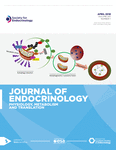Dietary soy-phytoestrogens decrease testosterone levels and prostate weight without altering LH, prostate 5alpha-reductase or testicular steroidogenic acute regulatory peptide levels in adult male Sprague-Dawley rats
Abstract
Nutritional factors, especially phytoestrogens, have been extensively studied for their potential beneficial effects against hormone-dependent and age-related diseases. The present study describes the short-term effects of dietary phytoestrogens on regulatory behaviors (food/water intake, locomotor activity and body weight), prostate weight, prostate 5alpha-reductase enzyme activity, reproductive hormone levels, and testicular steroidogenic acute regulatory peptide (StAR) levels in adult Sprague-Dawley rats. Animals were fed either a phytoestrogen-rich diet containing approximately 600 microg/g isoflavones (as determined by HPLC) or a phytoestrogen-free diet. After 5 weeks of consuming these diets, plasma phytoestrogen levels were 35 times higher in animals fed the phytoestrogen-rich vs phytoestrogen-free diets. Body and prostate weights were significantly decreased in animals fed the phytoestrogen-rich diet vs the phytoestrogen-free fed animals; however, no significant change in prostate 5alpha-reductase enzyme activity was observed between the treatment groups. Locomotor activity levels were higher in the phytoestrogen-rich vs the phytoestrogen-free animals during the course of the treatment interval. Plasma testosterone and androstenedione levels were significantly lower in the animals fed the phytoestrogen-rich diet compared with animals fed the phytoestrogen-free diet. However, there were no significant differences in plasma LH or estradiol levels between the diet groups. Testicular StAR levels were not significantly different between the phytoestrogen-rich vs the phytoestrogen-free fed animals. These results indicated that consumption of dietary phytoestrogens resulting in very high plasma isoflavone levels over a relatively short period can significantly alter body and prostate weight and plasma androgen hormone levels without affecting gonadotropin or testicular StAR levels. The findings of this study identify the biological actions of phytoestrogens on male reproductive endocrinology and provide insights into the protective effects these estrogen mimics exert in male reproductive disorders such as benign prostatic hyperplasia and prostate cancer.











